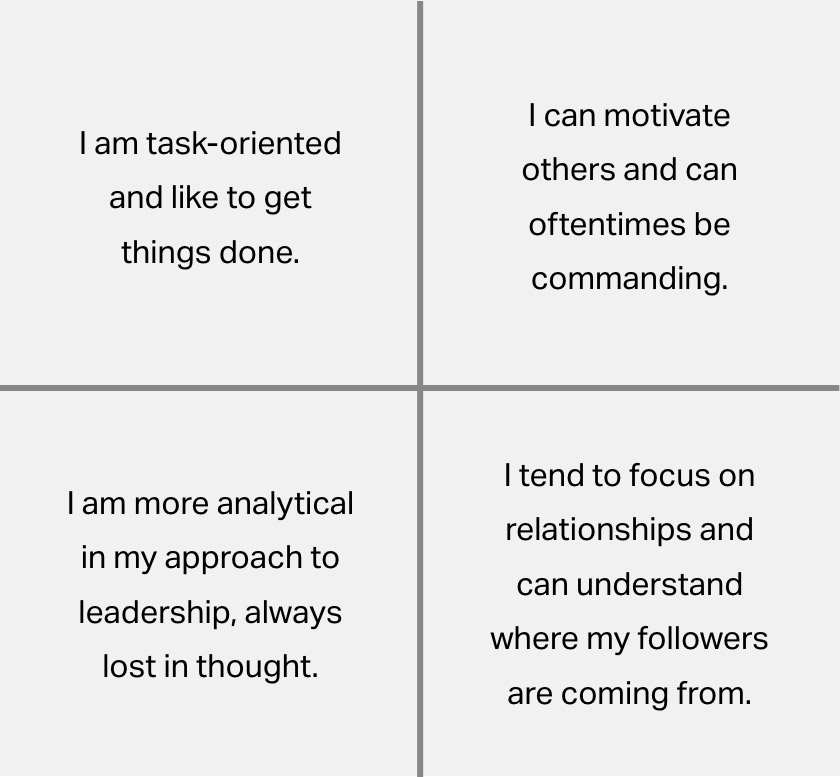In business, your role as a leader or follower shapes your strategy and vision. Your position impacts team dynamics and overall success.
Exploring your role in the business landscape is crucial to understanding your impact on company culture and direction. Leaders often drive innovation, inspire teams, and set strategic visions, steering their businesses toward growth and success. They exude confidence and are decision-makers, setting the course for action and taking accountability for outcomes.
On the other hand, followers play a supporting role, executing tasks, bringing expertise to the table, and contributing to the leader’s vision. These crucial roles are not static and can shift as individuals develop within a company. Identifying whether you’re a leader or follower can provide valuable insights into your professional development and the roles you naturally gravitate towards within a business environment. This awareness can help optimize your strengths, tailor your career path, and enhance teamwork and productivity, regardless of your position.
Leadership Vs. Followership
Business leaders embody certain traits that set them apart. They harness vision, showcase decisiveness, and aren’t afraid to take risks. Their ability to inspire and motivate their team is evident. Leaders have a knack for strategic thinking and often embrace change as an opportunity.
On the other hand, followers in business play a pivotal role. They exhibit supportiveness, showing commitment to the team’s objectives. A good follower listens effectively and executes tasks with diligence. They bring consistency and can be relied upon to follow through with directives.
Self-assessment For Business Roles
Identifying your dominant traits and your decision-making style is crucial. Start by asking yourself key questions about your behaviors. Do you often take the lead on projects? Or do you prefer supporting roles? Leaders tend to initiate action and set direction. Followers might collaborate and execute plans.
An effective exercise involves listing past decisions. Note whether you sought advice or moved forward on your own. Your pattern will reveal tendencies as either a leader or a follower. It is important to understand these roles. They impact business success and team dynamics.
Analyze scenarios where you had to make quick decisions. Were you comfortable and decisive? Leaders often are. Or did you feel the need for more input? That might suggest a follower’s approach.
Impact Of Leadership In Business Growth
Leadership plays a crucial role in setting and achieving business goals. Leaders guide teams towards a unified direction. They clarify the purpose and the path to business success. A strong leader embodies the company’s values and vision. They inspire others to pursue collective objectives.
Innovative leadership can transform a company. It encourages exploration of new ideas. Creative thinking becomes the norm in such environments. Leaders who foster innovation empower employees. They allow them to bring unique solutions to the table. This can lead to breakthroughs and significant progress.
The Role Of Followers In A Business Ecosystem
Supporting leadership decisions is crucial for any business’s success. Team members must respect and trust their leader’s judgment. By doing so, they provide a fertile ground for the leader’s vision to take root. It is their responsibility to offer constructive feedback when needed. They must also be ready to adapt to the leader’s strategies.
In executing strategic plans, followers play a pivotal role. They carry out tasks with efficiency and precision to meet the set goals. Each member’s contribution pushes the company towards achieving its objectives. It is through their diligent work that strategies transition from paper to practice. Their commitment translates into the company’s progress and overall success.
Balancing Leadership And Followership
Leadership and followership are vital to any business. Both roles are important. Strong leaders inspire and guide their teams. They set the vision. At times, they follow too. Effective followers support leaders and help the team succeed. Understanding the dynamics between these roles is crucial.
Adapting to situational needs means changing your role. Sometimes you lead, sometimes you follow. The key is to know when to do which. This flexibility helps your business grow. Be prepared to switch roles as needed. Flexibility makes for a healthy work environment.

Credit: www.forbesindia.com
Developing Leadership Skills Within Your Role
Developing leadership skills requires a proactive stance towards personal and professional growth. Embracing continuous learning means seeking out new knowledge. Leaders often invest time in workshops, books, and seminars to sharpen their skills.
Being a leader also involves taking initiative. Rather than waiting for instructions, effective leaders assess situations and act decisively. They set goals for themselves and encourage their teams to do the same. Such leaders emerge by accepting challenges and displaying confidence in their decisions.
- Read widely – Leaders read books both inside and outside their field.
- Ask questions – They seek advice and are curious.
- Practice new skills – Implementation is key to learning.
Recognizing When To Lead And When To Follow
Leaders and followers are vital in a business setting. A dynamic environment calls for quick decision-making and picking the right role. One might lead with confidence during a project launch. Alternatively, the same person might decide to follow during team brainstorming. Success often hinges on reading the context correctly.
Strong leaders recognize the importance of their team’s abilities. They know when to utilize the unique strengths of team members. This maximizes efficiency and promotes a healthy workplace dynamic. Learning to recognize these moments is crucial for leadership. Effective leaders also understand the value of following when a team member’s skill surpasses their own in certain areas.
Credit: www.driveyoursuccess.com

Credit: www.gallup.com
Conclusion
Embrace your role, be it leader or follower, and leverage it to boost your business success. Each position plays a critical part in a thriving enterprise. Remember, leadership inspires innovation, while followership ensures stability. Choose your path wisely to propel your business forward.
Here’s to forging ahead, together.











